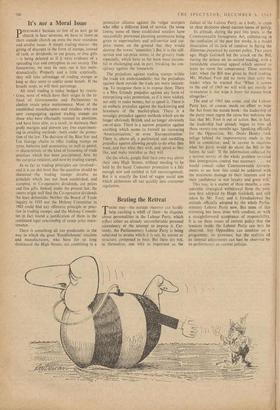It's not a Moral Issue P RESUMABLY because so few of
us now go to church to hear sermons, we have to listen to them outside church on even the most mundane and secular issues. A simple trading matter—the giving of discount in the form of stamps, instead of cash, or dividends, or cut prices, or free gifts - is being debated as if it were evidence of a spreading vice and corruption in our society. The housewives, we may lie sure, see it less melo- dramatically. Properly and a little sceptically, they will take advantage of trading stamps as long as they seem to confer some benefit. If the benefit stops, so will their patronage.
All retail trading is today hedged by restric- • Lions, most of which have their origin in the re- fusal of Governments and Parliaments to abolish resale price maintenance. Most of the established manufacturers and retailers who are now campaigning against trading stamps are those who have effectually resisted its abolition; and have been able, as a result, to maintain their profit margins and prevent any free experiment- ing in retailing methods—both under the protec- tion of the law. The decision of the Blue Star and Lex Garage chains to offer trading stamps on tyres, batteries and accessories, as well as petrol, is characteristic of the kind of loosening of trade practices which has been precipitated, first, by the cut-price retailers, and now by trading stamps.
In so far as trading principles are involved— and it is on this level that the question should be discussed--the trading stamps involve no principle which has not been established, and accepted, in Co-operative dividends, cut prices and free gifts. Indeed, under the present law, the courts might well find the Co-operative dividends the least defensible. Neither the Board of Trade inquiry in 1933 nor the Molony Committee in 1963 could find any offensive principle or prac- tice in trading stamps; and the Molony Commit- tee in fact found a justification of them in the continued legal sanctioning of resale price main- tenance.
There is something all too predictable in the way in which the great 'Establishment' retailers and manufacturers, who have for so long dominated the High Streets, are combining in a protective alliance against the vulgar usurpers who offer a different kind of service. (In some towns, some of these established retailers have successfully prevented planning permission being given to supermarkets and self-service and cut- price stores, on the ground that they would destroy the towns' amenities.') But it is the self- service and cut-price stores, in the grocery trade especially, which have so far been most success- ful in challenging and, in part, breaking the con- spiracy against the housewife.
The prejudices against trading stamps within the trade are understandable; but the prejudices against them outside the trade are more interest- ing. To recognise them is to expose them. There is a Mrs. Grundy prejudice agdinst any form of enterprising sales promotion, as if it were wicked, not only to make money, but to spend it. There is an aesthetic prejudice against the huckstering and brassiness of the market-place. There is a nostalgic prejudice against methods which are no longer obviously British, and no longer obviously out-of-date. There is a narrow prejudice against anything which seems to foretell an increasing `Americanisation,' or even 'Europeanisation.' There is, above all, a puritanical and meddling prejudice against allowing people to do what they want, and buy what-they wish, and spend as they like, and make mistakes as they will.
On the whole, people find their own way about their own High Streets, without needing to be held by the hand. Consumer protection is a fair enough aim and entitled to full encouragement. But it is exactly the kind of vague social aim which alchemises all too quickly into consumer regulation.






































 Previous page
Previous page